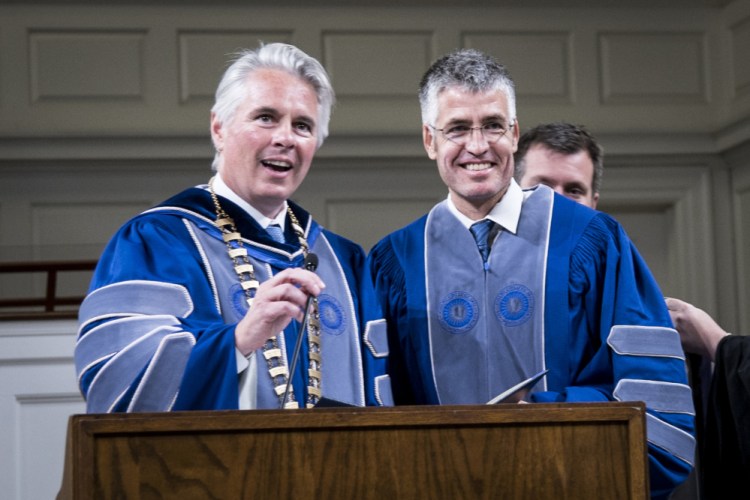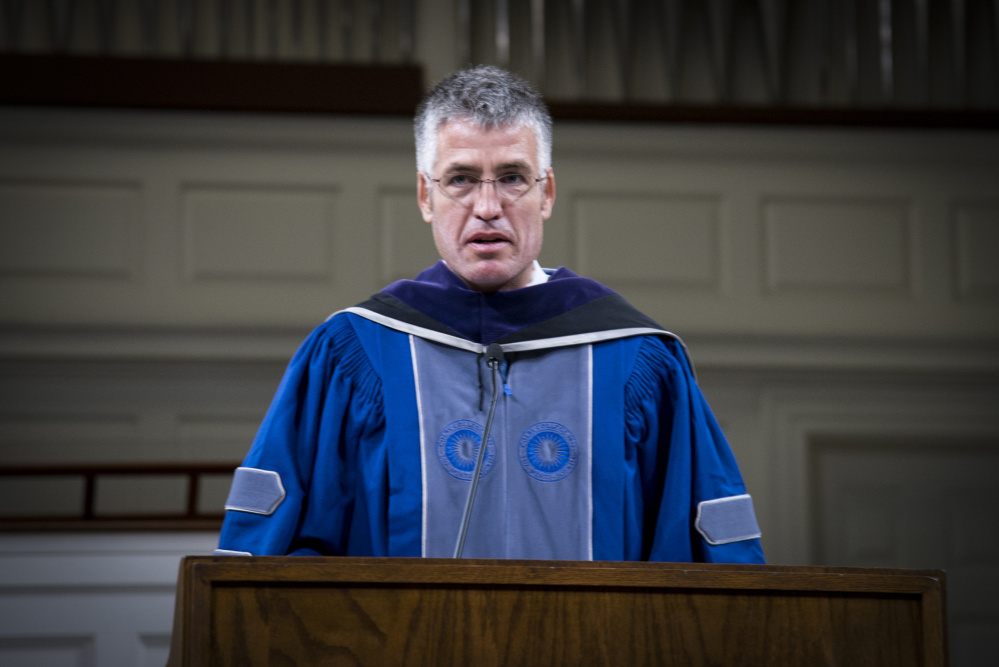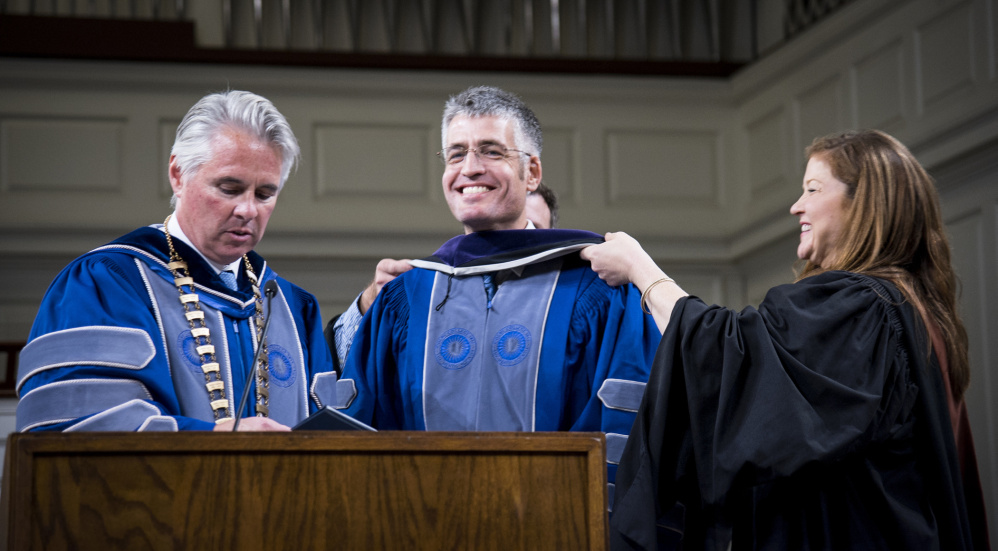WATERVILLE — For Alec MacGillis, his life’s work has been about what he sees as the places and people left behind.
Speaking at Colby College’s Lorimer Chapel Monday night, MacGillis, an award winning journalist who has covered politics and inequality during his career, said there are all kinds of inequality gaps in the world and the country. There’s the gap between the rich and poor, but also the physical gaps between places. The movement of jobs and the majority of a region’s economy has lead to some places, smaller cities and rural states, getting left behind.
MacGillis is the recipient of the 2017 Elijah Parish Lovejoy Award for courageous journalism, an annual award that Colby College bestows upon a journalist in honor of Lovejoy, an Albion native and Colby graduate killed in 1837 in retaliation for his newspaper work promoting the abolitionist movement.
Past Lovejoy winners include Bob Woodward, James Risen, Bill Kovach, David Broder, Katharine Graham and Carl T. Rowan. Last year’s winner was Alissa Rubin, a Pulitzer Prize winning war reporter.
MacGillis said media plays a role in the inequality he spoke of, simply because local news coverage has shrunk across the board, as more media jobs sprout up in Washington, D.C. This is personal for him, MacGillis said, because he was raised in a newspaper community. His father was a newspaper journalist, which inspired him. Small town papers are struggling more than ever, with many being forced to shut down. Even in Baltimore, where he lives and used to work, is lacking in local coverage. He pointed to a story he did recently, on an apartment complex that was owned by the family of Jared Kushner, publisher who is currently senior advisor to U.S. President Donald Trump and husband to Trump’s daughter, Ivanka. He said the Kushner’s were taking advantage of the tenants, hitting them with questionable fees and legal troubles. One person he spoke with, a single mother who wanted to open an assisted living facility, was hit with fees three years after she moved out. The legal battles wiped out her finances. It wasn’t until the story came out, he said, that people even found out about these left behind people. So people started reaching out, sending money and kind words to the woman.
“It turns out some people do care about the left behind places, we just have to go there first,” he said.
MacGillis spoke about national politics, and how the left behind places and the people in those places gravitated towards Trump. He said the parties have become concentrated and how the Democratic party has essentially become centered in major metropolitan effort, the people in rural areas began to feel alienated. He said there’s no doubt that the places where Trump did best during the general election are places that have struggled.
“A feeling of getting left behind would expose you to a political message,” he said.
Before writing for ProPublica, MacGillis s spent three years writing for The New Republic and five years as a national reporter for The Washington Post, where he was part of the team whose coverage of the Virginia Tech shootings won the 2008 Pulitzer Prize for breaking news. He also was a metro reporter for five years at the Baltimore Sun, where he and collaborators were Pulitzer finalists for their coverage of the Beltway sniper.
MacGillis won the 2016 Robin Toner Prize for Excellence in Political Reporting. His work has appeared in The New Yorker, Atlantic and New York Times Magazine. He is the author of “The Cynic,” a 2014 biography of Sen. Mitch McConnell, the GOP Majority Leader from Kentucky. A native of Pittsfield, Massachusetts, MacGillis now lives in Baltimore. In 2016, MacGillis published a long-form story that connected Baltimore’s failed public transportation system to a history of deeply rooted racial inequality, titled “The Third Rail.”
In introducing MacGillis to a nearly-full Lorimer Chapel, Colby President David Greene praised MacGillis’s reporting as work that exposes inequalities around the country. He said MacGillis has written about the policies of gun control, something on the minds of many across the country in the wake of the rampage in Las Vegas on Sunday, where a gunman killed 59 people at a concert and wounded more than 500 others. Greene said “what rights are we protecting” in allowing someone to have as many guns as the gunman did, but not protect the rights of those at the concert to live peacefully. And for that, Greene praised MacGillis as reminding people from “the fundamental freedom from oppression.”
“He’s covered many important issues of our time,” Greene said of MacGillis.
MacGillis said he has written about gun control, and said proponents of strong control have largely been “unduly fatalistic” about the prospects-of real reform, and said “we’ll see where things go” following the rampage.
MacGillis was chosen as the recipient of this year’s Lovejoy award for his “courageous and unyielding efforts to reveal truths that have been carefully shielded from public scrutiny,” Greene said in a press release announcing MacGillis is the award’s recipient. MacGillis, known for his deep reporting on social issues and public policy, is a Pulitzer Prize winning reporter.
Colin Ellis — 861-9253
cellis@centralmaine.com
Twitter: @colinoellis
Send questions/comments to the editors.





